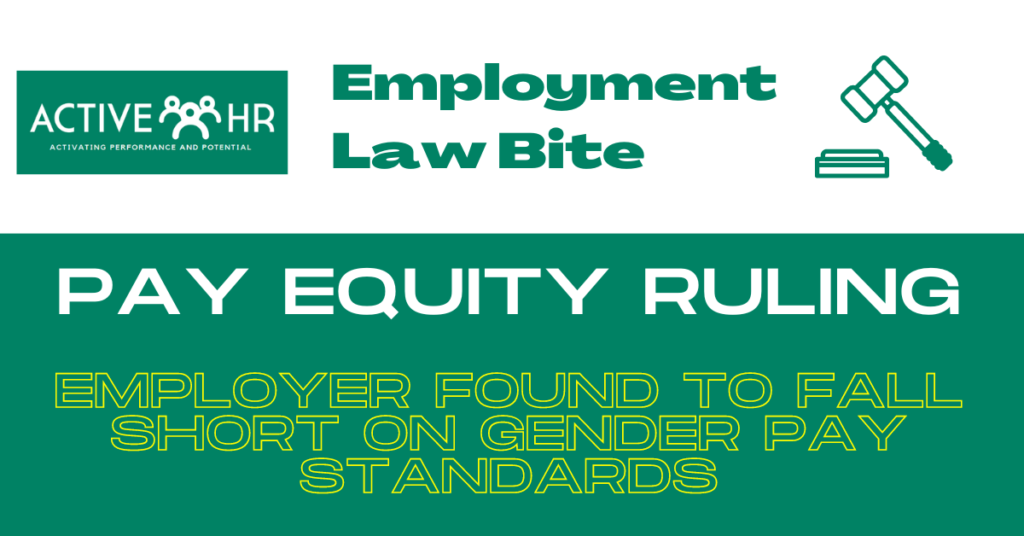
A landmark Employment Law ruling has been made by the Full Bench of the Fair Work Commission who found that a female Chef employee was paid less than her male colleagues while performing the same work. This is the first ruling of its kind involving the application of recently introduced equal pay order laws under the FW Act.
The chef who brought the application claimed that she was paid $65K per annum (The Award minimum) and that her three make colleagues received an annualised wage of $80K. The claimant sought $12.5K in salary back pay, back payment for holidays and allowances and $3K for extreme stress and anxiety. The back payment claims were based around her commencement of employment in 2022.
In support of her application, the female chef filed payroll records and witness statements including one from her former supervisor and other chef colleagues whose evidence showed that she “performed the same duties and had the same level of responsibilities as the other chefs, worked in the same environment, and performed her work to the same if not a higher standard than the other chefs”.
The employer did not file any witness statements, although they did however contend that female chef’s male colleagues were paid more because of retention purposes centred around their length of service and contribution to the company.
Evidence of gender inequality but not in a “present tense”
The Fair Work Commission panel found that there was evidence of “clear” gender inequality, in that remuneration was not of equal or comparable value. The panel also did not accept the employer’s response and viewed this as, “misconceived”.
The panel noted that in making the ruling it felt that the “critical question” was whether it was obligated under the Act to make an equal remuneration order, and in doing so considered two aspects of the law:
-
- Whether the employment had ceased or was ongoing. In this case it had ceased.
-
- That “for the employees to whom the order will apply, there is not equal remuneration for work of equal or comparable value”.
I respect to the first point that panel found on this particular occasion the chef who applied for the order was not in the employer’s current employment. It also ruled that the legislation did not deal with matters of past tense. Fir this reason the application was not accepted, even though it found evidence of pay inequity.
Implications of ruling
As an area of Employment Law we will be watching future rulings on this matter with some interest, as we know that the use of retention payments by employers is common practice in tight labour market environments. It is our view that this ruling raises some further yet to be tested areas of consideration in this regard.
When you read Section 302 it heavily apparent that this section of the act has been designed to address gender inequality with specific reference made to industries that are traditionally male dominated. The section however, is not restricted to this space
An employer’s best defence is one where it can demonstrate through its own policy and practice, that it does proactively give regard to gender-based pay equality and it does adjust to address perceived concerns of gender inequality including actions to address unconscious bias that may have created pay arrangements and structures that favour men over women.
Some recommendations for employer:
-
- Where market-based factors have influence on rates of pay and give cause for differentiation, these adjustments in pay should be set out by a way of a policy that clearly reference valid reasons for the differentiation. Relying on matters such as tenure as a basis for higher pay is clearly not acceptable to the Fair Work Commission.
-
- Where classification or job evaluation systems are used to determine rates of pay have in place mechanisms that give regard to an issue of gender bias.
-
- Where performance and competency is used the employer should have a policy that outlines how this is to applied in a procedurally fair way and should also undertake reviews of salary in a way that gives regard to and seeks to proactively address any perceived gender inequality issues.
At Active HR we help employers shape their workplaces into great ones, the type that attracts the high calibre people. We also know that this quality of talent is drawn towards workplaces that offer pay equity and workplace equity generally. If you have questions around issues of pay equity at your business and you would like an opportunity to discuss this further, or any matter relating Employment Law feel free to contact us at Active HR.
